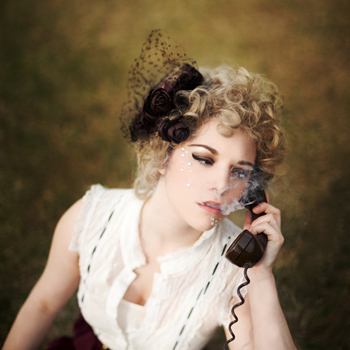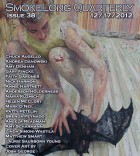I read submissions blind, so it was a nice surprise to find you’d written “Boy Cyclops.” I’m familiar with both your blog and your book reviews over at PANK, but I’d never read any of your fiction.
The fantastic elements in this story are given such vivid and specific imagery that they could be real. A lot of your blog entries depict your very real surroundings. What was it like writing a mythological character so that he could believably exist in similar surroundings?
It’s interesting that you bring up my blog and book reviews here, as it forces me to think how they relate to the fiction writing. I believe that I’m always trying to gather a sense of place together. I move around a lot, and feel the need to ground myself. When I’m reading a book, that’s what I look for—in what ways the author has brought out the textures of their world. The sensual details of place, the richness of the particular. I have the urge to copy that.
My blog contains a lot of pictures, and right now because I’m based in Edinburgh, they’re pictures of the city. In the centre of the city there’s a cliff called Salisbury Crags, which I love for their constant changing with the differences of light. The crags are said to have influenced Arthur Conan Doyle when he wrote The Lost World, his novel about a journey to an isolated plateau populated by dinosaurs and other prehistoric beasts. The hill above the crags, Arthur’s Seat, is named for the mythical King Arthur. In fact, the city itself has been the background for all kinds of historical weirdness, inflecting an oddness to much of the fiction here. The story of “Jeckyll and Hyde” would be another example—based on a real person, Deacon Brodie, who was respectable by day and a violent thug by night. Edinburgh is a city that’s both aesthetically pleasing and a place where the real and unbelievable closely overlap. So in that way, it seems to me that a cyclops could quite easily make his home here.
I like what you say about the overlap of the real and the unreal and how the Salisbury Crags change with the light. This story changes, too, near the end when the narrator’s perception shifts, and the cyclops becomes any other boy with two eyes. In fact, the story shifts so completely that the sense of wonder is now in the mundane instances at the bar. What are some of the smaller things in your day to day that inspire quiet awe?
I find moments of disruption—I’d say, that’s one interpretation of “awe”—in everyday life at moments of quiet contemplation. Now I’m going to sound like I meditate or have some kind of inner peace, when it’s not true at all (I blunder about online and through my day when I should be sitting still, making notes) but when the action slows down, when a sudden hush comes over a conversation, and people stop fidgeting and being awkward and just sit with each other. When you’re walking along a road in shadow and the sun comes out and some leaves are blown into your path and someone’s passing you, holding their hat down, or the rain has stopped but you can see it further across the city, sweeping in. The silence that comes on, forcing a break, a suspension, a readjustment. It’s when I finally notice the world and how gorgeous it is, right there, the whole time.
Incidentally, I love that in some of your fictions, you’ve set scenes on porches. A porch, it seems to me, was designed as a kind of stage for just this moment of rest, consideration. And for drinking nice alcoholic beverages upon. I am jealous of the U.S. and its porches, is what I am saying.
Libraries are another of those quiet places where there’s a sort of sleepy hum about everything. There can be too much focused silence, though, as with the deer/librarian hybrids in this story. They try to alleviate their eternal boredom by scratching their initials into their desks with their antlers. This seems like both a subtle act of creation and a subtle act of destruction. How do you lash out when you’ve had too much quiet time?
I wish I had a cooler way of answering this. I could say I wander into the mountains, for example, and climb to the highest peak to yodel into the abyss. But really, I just pack up and go to the gym, or I finally get round to calling chattier friends. I thought once perhaps I’d make a good librarian, because I tolerate silence pretty well. But I’d be just like the hybrids, compelled by fear of the passing or non-passing of time (so hard to judge in a library, despite the clocks on the wall) to make my mark on something that didn’t require it.
There’s some play with the word “fortune” in this story. Tarot cards make an appearance. The cyclops possesses a small monetary fortune, but through the tarot, he also possesses the means to tell the narrator her own fortune. Have you ever had your Tarot read?
I have. It was in an Edinburgh basement bar/sushi joint that no longer exists. Seats as wide as beds everywhere, people clambering on them, kicking off their shoes. One night there was a Tarot reader set up in a back room, and I decided to go for it. She read my fortune but I don’t remember anything of what she said, only that I thought at the end “is that it?” I was disappointed in her lack of theatricality. If you have all these gorgeous illustrated cards at your disposal, you should be able to flicker across them, weave something from the symbols, tell me a rich imaginary story of my future to warm me until I forget it.



 The core workshop of SmokeLong Fitness is all in writing, so you can take part from anywhere at anytime. We are excited about creating a supportive, consistent and structured environment for flash writers to work on their craft in a community. We are thrilled and proud to say that our workshop participants have won, placed, or been listed in every major flash competition. Community works.
The core workshop of SmokeLong Fitness is all in writing, so you can take part from anywhere at anytime. We are excited about creating a supportive, consistent and structured environment for flash writers to work on their craft in a community. We are thrilled and proud to say that our workshop participants have won, placed, or been listed in every major flash competition. Community works.